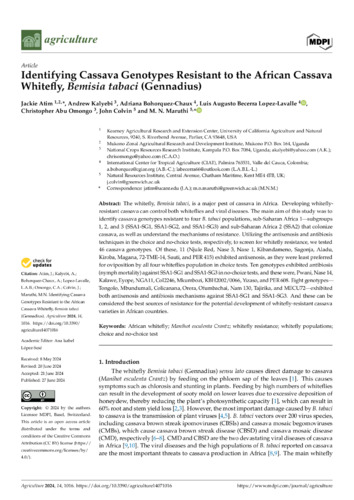Identifying cassava genotypes resistant to the African Cassava Whitefly, Bemisia tabaci (Gennadius)
The whitefly, Bemisia tabaci, is a major pest of cassava in Africa. Developing whitefly-resistant cassava can control both whiteflies and viral diseases. The main aim of this study was to identify cassava genotypes resistant to four B. tabaci populations, sub-Saharan Africa 1—subgroups 1, 2, and 3 (SSA1-SG1, SSA1-SG2, and SSA1-SG3) and sub-Saharan Africa 2 (SSA2) that colonize cassava, as well as understand the mechanisms of resistance. Utilizing the antixenosis and antibiosis techniques in the choice and no-choice tests, respectively, to screen for whitefly resistance, we tested 46 cassava genotypes. Of these, 11 (Njule Red, Nase 3, Nase 1, Kibandameno, Sagonja, Aladu, Kiroba, Magana, 72-TME-14, Sauti, and PER 415) exhibited antixenosis, as they were least preferred for oviposition by all four whiteflies population in choice tests. Ten genotypes exhibited antibiosis (nymph mortality) against SSA1-SG1 and SSA1-SG3 in no-choice tests, and these were, Pwani, Nase 14, Kalawe, Eyope, NGA11, CoI2246, Mkumbozi, KBH2002/0066, Yizaso, and PER 608. Eight genotypes—Tongolo, Mbundumali, Colicanana, Orera, Ofumbachai, Nam 130, Tajirika, and MECU72—exhibited both antixenosis and antibiosis mechanisms against SSA1-SG1 and SSA1-SG3. And these can be considered the best sources of resistance for the potential development of whitefly-resistant cassava varieties in African countries.

